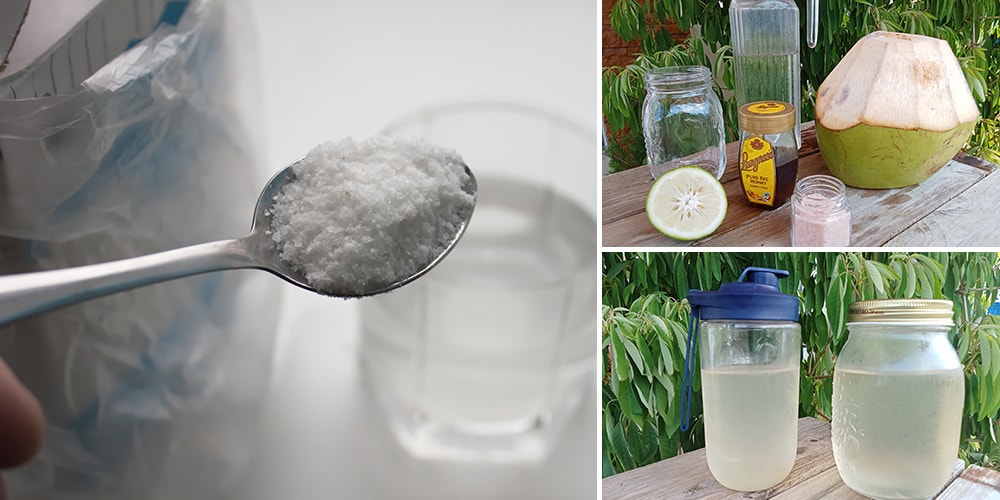
Why You Should Add This to Your Water
You are sweating profusely after strenuous effort and you drink a lot of water. No big deal with dehydration, right? Well, there is a partial answer to that.
Even though water does replenish bodily fluids, there is still a fair chance you can end up dehydrated. Water alone does not contain the necessary amount of minerals needed to replenish the body’s electrolytes. In this article, I will show you how to make something better than water.
Why You Should Add This to Your Water
The body can become depleted of fluids and minerals through sweating and urination. It makes matters worse for people who DO NOT get plenty of water at all.
Following the old-age tradition of rehydration, adding sugar and salt to water is a great help in maintaining the balance of electrolyte levels. It does not only replace the fluid you have lost but also replaces the minerals that support the body’s functions.
Sea Salt
Salt is an important component in an oral rehydration solution. In small amounts, it can help restore the electrolyte balance in the body. Understanding salt is a compound that contains sodium and chloride which helps in extracellular cell activities.
Sea salt also contains trace amounts of minerals like potassium, calcium, and magnesium needed for maintaining the fluid balance.
Many sports and fitness enthusiasts use Himalayan salt or pink salt in their drinking water. These types are less processed when compared to table salt. It also contains a lot more minerals including iron which gives it its pink color.
I personally like to rub sea salt and olive oil on my joints after a long day. Here‘s why.
Sugar
Sugar is not an electrolyte in the sense that it does not become electrically charged when dissolved. However, in electrolyte preparation, it plays a rather more vital role.
The glucose in sugar is important in facilitating optimum electrolyte absorption. With sugar in water, the ions get to work smoothly which in turn ensures proper hydration.
What Are Electrolytes
Electrolytes are water-soluble substances and compounds that dissolve in water and produce ions. Ions are electrically charged particles that are important in proper body functioning.
Electrolytes maintain the amount of water in the body and blood acidity. It supports electrical neutrality in the cells to support the nerve and muscle functions.
Electrolyte imbalance, whether low or high, disrupts these body functions. It may happen if you have too much or too little of a particular mineral. Irregular heartbeat, dizziness, and fatigue may happen; or worse yet, it may cause life-threatening complications.
What Makes Up Electrolytes
Sports drinks are one of the most popular beverages after physical effort. The reason why drinking sports drinks is worrying, however, is that most people don’t need a sports drink to rehydrate. This is especially true if the dehydration is severe and needs medical attention.
The recommended amount for sports drinks varies according to activities. Unless you are physically active and need carbs and electrolytes, you do not need the sports drink.
What you need instead, in moderate amounts, is a balanced concentration of these minerals:
Sodium: It is an essential mineral that helps in regulating the volume of extracellular fluid and improving nerve and muscle function.
Potassium: It helps transport nutrients into the cells and remove waste products from them. Potassium supports the metabolism, heart, nerve, and muscle functions.
Calcium: Associated with bones and skeletal function, calcium is also an important electrolyte for muscle and nerve functions.
Bicarbonate: Bicarbonate is in charge of the proper acid-base balance or pH balance in the blood. The kidney regulates the bicarbonate concentration helping it move the waste product from the bloodstream and reabsorb the filtered carbonate.
Magnesium: It supports metabolism, muscle functions, neurological functions, and neurotransmitter release. It helps boost calcium intake and absorption necessary for improving cellular activities and skeletal mineralization.
Chloride: It’s responsible for regulating the blood pressure level and maintaining body fluids. It regulates the nutrients and amount of fluid that goes into and out of the cell. Chloride is also important in maintaining the pH level and facilitating the cellular oxygen and carbon dioxide flow.
Phosphorus: It’s essential for metabolic processes. It helps with muscle contraction and nerve conduction.
Too high or too little of the electrolytes can disrupt normal body processes. A slight electrolyte imbalance is not noticeable. But severe ones will pose varying symptoms such as headache, fatigue, muscle spasms, numbness, nausea, irregular heartbeat, and confusion. It may also cause diarrhea or constipation.
How to Maintain Electrolyte Balance
You do not only lose electrolytes from sweating. Diarrhea and urination also make you lose electrolytes.
Replacing the fluid that you lose is one way of helping yourself maintain electrolyte balance. Many of these elements also come from your food.
Tap water contains some electrolytes. However, drinking tap water alone cannot ensure proper hydration since it lacks the necessary minerals needed for fluid balance.
If you are sweating profusely, have loose bowels or urinate frequently, you need to add electrolytes to your drinking water.
The following practices may help: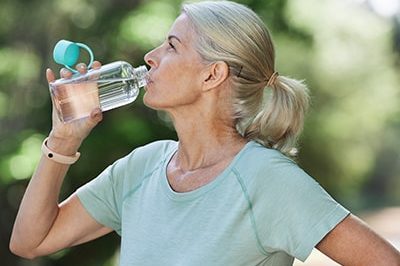
- Drink water with a pinch of sea salt
- Take ginger tea
- Drink coconut water
- Eat watermelon
- Drink lemonade
- Snack on fruits
Note: This post is intended for adults with mild dehydration. Severe dehydration, especially in infants, very small children, and seniors, needs medical attention. The doctor will check for the severity of the dehydration and other accompanying symptoms. Severe cases need intravenous solutions to speed up rehydration and body recovery.
DIY Coconut-Lime Electrolyte Drink
Here is a simple recipe for achieving proper hydration and helping the body to cool down.
This recipe uses pink salt and lime as a source of potassium and other trace minerals. It has honey as a natural sweetener. You may also use agave instead of honey for the same provided quantity.
This homemade electrolyte has coconut water, purported to be Nature’s Gatorade. Coconut water is rich in potassium, manganese, and sodium for better hydration. It is more beneficial than plain water in replenishing lost electrolytes.
Ingredients
- 1 cup of water
- 1 cup coconut water
- ½ cup lime juice (you can use lemon or orange)
- 1 tbsp honey
- ½ tsp Himalayan salt
Put all the ingredients in a mason jar and put the lid. Shake the jar to mix the ingredients well.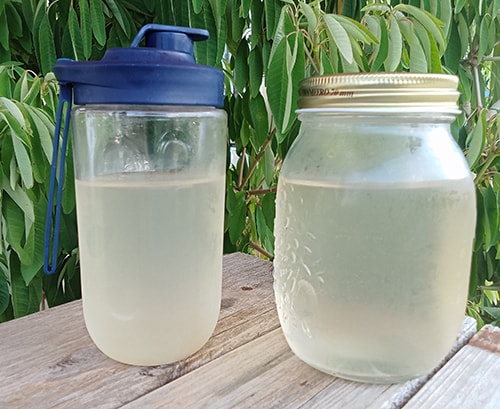
How To Use
This electrolyte water will stay fresh in the fridge for a couple of days. You can use plain water instead of coconut water and the mixture can last for up to a week.
For this recipe, I used lime which is slightly less acidic than lemon to make it lighter in taste but still delicious. Either way, both are good options. You can drink one cup of this electrolyte beverage per day.

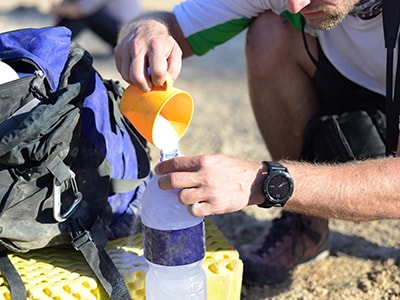
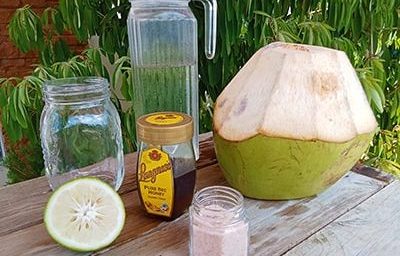
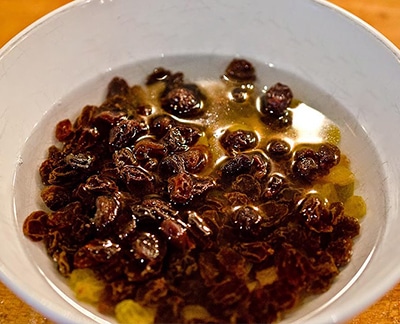
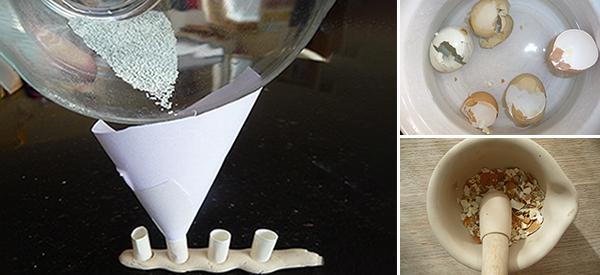


Great information.
I follow a keto lifestyle. Will erythritol work the same as sugar. I’m just finally getting my insulin resistance under control and don’t want to ramp it back up with sugar (natural or refined)
Thanks
Hi Frank,
Thank you for sharing that!
Yes, you can use Erythritol instead of sugar/ honey if you wish.
Many blessings and good health!